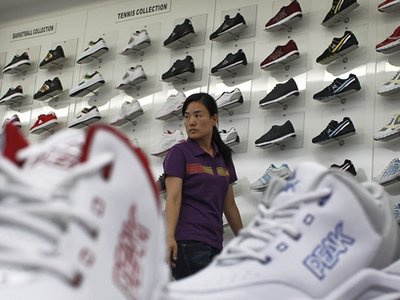Companies
Chinese sports companies focus on sponsorships
(Agencies)
Updated: 2010-06-14 15:09
 |
Large Medium Small |
BEIJING: The newest sponsor of women's tennis is a half-billion dollar sporting goods maker that virtually no one outside of China has ever heard of.
 |
|
A shop assistant works at a Peak sports shop in Beijing, June 13, 2010. [Agencies] |
Peak, which announces its five-year deal with the Sony Ericsson WTA Tour this week, is the latest cash-flush Chinese company to form a partnership with well-known foreign athletes, teams and leagues.
As with other such deals, the focus is on boosting brand image at home. In fact, shoes and other products from companies such as Peak, Li Ning, Anta and Xtep can hardly be found for sale outside the country.
The brands are targeting the burgeoning Chinese middle class, which has a growing interest in leisure activities and plenty of pocket money. The idea is that Chinese consumers will think more favorably about domestic brands and their international status when they see established foreign stars wearing the products.
"Right now we're learning from Nike. We hope one day we can catch up and surpass Nike, of course that is our goal," said 33-year-old Peak CEO Jim Xu. "But we're different because we know China better than Nike, we have products that are better suited to the Chinese market ... We can give consumers another choice."
The Chinese sporting goods market is worth $6 billion and expected to grow 14 percent a year, according to the China Sporting Goods Federation. While Nike remains the market leader, homegrown brands are catching up, appealing in particular to consumers in smaller cities with modern looks at prices a fraction of those of the foreign competition.
China's 1.3 billion potential fans are also irresistible to sports leagues and sponsorship deals give them a local partner in the market. The WTA points out there are 130 million Chinese interested in tennis and 10 million recreational players -- double the number of those in France, an established market.
Even those figures belie the market's potential. Despite the success of Chinese players such as Li Na and Zheng Jie, tennis is still a relatively new sport here. Audiences too are somewhat raw: During the 2008 Olympics in Beijing, local fans breached tennis etiquette by cheering during long rallies and sighing loudly over faults.
"We'll suffer through the pains of having new tennis fans doing those sorts of things, I'd much sooner take a whole lot of young, new, energetic tennis fans over no fans," WTA Tour President David Shoemaker said.
Anta sponsors athletes including top women's tennis players Zheng and Jelena Jankovic, while Xtep has a partnership with Birmingham City in the English Premier League.
So far, the Chinese have been conservative and signed only established players in hopes of maximizing their investments.
"(The Chinese brands) want to minimize the risk as much as possible because this is new territory for them and they don't want to get caught looking bad," said Terry Rhoads, a former Nike executive who runs Zou Marketing, a sports marketing company in Shanghai.
Underscoring their underdog position, China's most famous athlete, the NBA's Yao Ming, has a sponsorship deal with Reebok.




